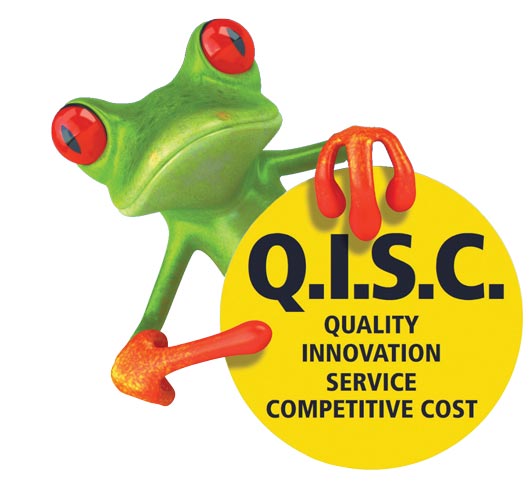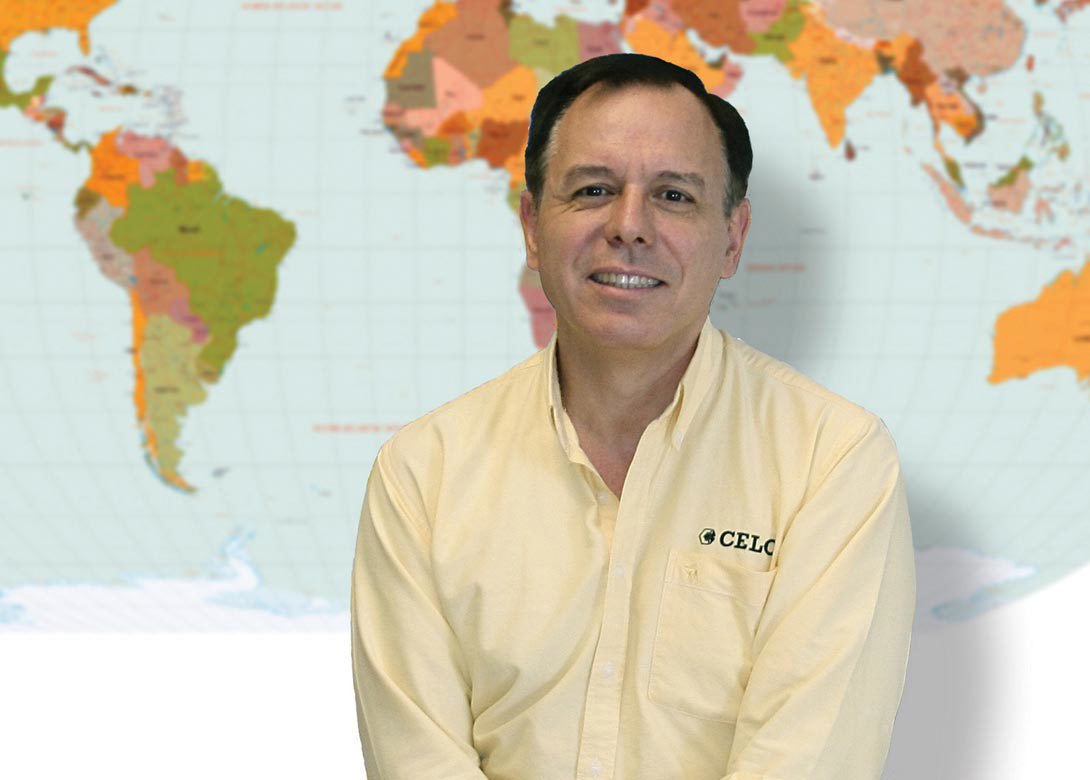Adapting, compulsive optimism and… a charismatic frog
10 August 2015
Face2Face with Ramón Ceravalls, CEO Grupo CELO
Fulfilling a long-standing promise to visit CELO’s Spanish headquarters at Castellar del Vallès, outside Barcelona, Phil Matten, executive editor, took the opportunity to explore Ramón Ceravalls’ thoughts on a wide range of issues: From Spain’s economic recovery to manufacturing in China, from the role of family companies to celebrating fifty years in business… even if two years late.
‘Adapt and overcome’ is a widely heard if not always properly adopted aphorism. It has been at the core of CELO’s business, not just during recent traumatic years but also throughout more than fifty years of trading. “One of CELO’s strengths is its flexibility,” Ramón Ceravalls says. Another is optimism. “I am always optimistic” – adding with a wry smile “compulsively optimistic I would say.”
He’s not just optimistic about the future of CELO but also about how Spain recovers from the excruciating impact of the 2008/9 crisis. “Spain will do better and better,” he says. “We have many very well educated young people. We have a very good health system, we have very good basics, we have good agriculture, the weather, good tourism and we have a skilled labour force.”
He admits: “It was a great shame to see young people forced to leave Spain to find work,” but even here he senses cause for optimism. “Those that come back, and not all will, bring far greater skills and experience which will enrich Spain and its industries.”
Nevertheless Spain still faces unemployment at an average 23%. Carefully sidestepping too deep a political debate Ramón Ceravalls is adamant: “We need to reduce the social subsidies – some people will be harmed but most will find work is the best long-term option.”
The work is unquestionably coming back in some sectors. “The first time I realised that something was changing for the better was when, four years ago, amid daily bad news about the Spanish economy, Ford announced a 800 million euros investment in its factory. I was amazed: I really thought ‘these people know something that I don’t, otherwise they would not do it’. This gave me a shot of optimism.” More recently investments from Volkswagen, Nissan and General Motors have reinforced the automotive sectors’ confidence in Spain.
One reason for these continued investments, Ramón Ceravalls is convinced, is because “there are a lot of small/medium size family owned companies with skilled people that provide an outstanding support infrastructure for industry”.
The construction sector, though, still has years, if not decades, before it will really recover. “Official data is not easy to find but my best estimate is there could be half a million houses and apartments unoccupied. More than half will never be sold in the next ten years because they are in the wrong location to attract buyers.” That is not just a matter of there being “plenty of choices closer to the beach”, he says. “Huge new neighborhoods were built on the expectation the government would bring transport links to them. Now these are truly ‘ghost cities’ – no shops, no schools, no hospitals, no infrastructure and no work.”
The construction market, Ceravalls assesses, crashed by 85%. “Renovation is now the only one sector that remains reasonably active.” Market structure and habits also changed dramatically, as Spain belatedly went through the evolution experienced in other European markets. “The traditional hardware store is now squeezed between the DIY chains and the direct to user suppliers.” Purchasing behavior also changed radically. “Contractors now live hand to mouth, buying only what they need to do today’s jobs.”
“I now hear people saying Spain is doing good,” says Ceravalls. “Well it is doing better, but it’s still not doing good.” Reflecting on CELO’s fortunes he says: “We have survived because we have adapted in the Spanish market, because we have a solid financial position, and because we had previously already developed our international businesses.”
Adapting to the hardware distribution sector really began in the early 1980s. Faced with an earlier crisis in Spain, CELO’s owners decided to retain their employees, continuing to manufacture and build up stocks. At the last minute, the crisis resolved, and CELO found itself with the largest stock of small screws in Spain. It started to sell to distributors that needed products quickly and in small quantities, and became the largest wholesaler of these products in Spain. In 2000 the purchase of another family owned Spanish company, Apolo Fijaciones y Herramientas S.L brought a strong and complementary brand for electrical and plumbing screws, fixings and support systems. Challenged by many competitors with strong offers in the fixings that account for a larger proportion of hardware retailers’ business, CELO looked to develop these ranges itself. “We did not feel comfortable doing this with a product we did not really know, so we decided we needed our own fixings company.” That led to the acquisition of MEA Befestigungssyteme GmbH in Germany, “which has really brought a lot of value to our Group,” Ceravalls says. “We have good people there who really know the business and produce good, safe products for specific applications.”
“We are always very focused on the customer and having products for very specific applications.” CELO’s leading position supplying self-tapping screws for the aluminium window market, is still very strong, particularly in the south of Spain, and is a clear illustration. The ingress of DIY chains and the changes in purchase habits have now driven the development of a complete range of CELO small packed product and the merchandising systems essential to support them.
The other 45% of Grupo CELO’s business focuses on supplying small screws direct to automotive and industrial customers. The process of adaptation has been different but every bit as crucial to the Group’s fortunes over the last five years. The impetus came long before the financial crisis when a major electronics customer relocated production from Spain, initially to eastern Europe and later to China. “We were caught out in the early stages of globalisation,” acknowledges Ramón Ceravalls, “and very quickly realised we had to adapt effectively to this trend.” A small warehouse in Hungary to service customers that had migrated there was followed in 2005 by a major investment in production in China. That came with a series of steep learning curves. “We started with our own capital; we bought the land; we built the factory. We had no debt so the fixed costs were really small. It was quite easy to get to breakeven but then as we started to grow the volumes we realised the profits did not come in the same as in Europe.”
“The competition is so strong, it really is an incredibly tough market.” CELO has been selective about its customer base in China, concentrating on European and North American implant industries, for automotive, domestic appliances and to a lesser extent electronics. What is completely consistent is CELO’s commitment to unimpeachable quality. “We started supplying customers only once we were absolutely certain we had achieved reliable quality levels. Even now, all products from our Taicang plant undergo final mechanical or optical inspection.”
One advantage for CELO is that the screws it supplies for use in both metal and plastic represent a small proportion of customers’ costs. “They really do not want to have different suppliers, different quality processes and documentation in their different factories around the world.” It means, though, that CELO goes where the customer goes with logistics operations now also established in Poland, Turkey and Mexico.
Managing currency exchange is also crucial. “Our strategy for the industry division is to have one company in Europe, producing in euros, and one in China, producing in a US Dollar linked currency. From these two companies we deliver to all our customers more or less globally.”
Language and business culture represented another area of adaptation although the common language is engineering; one CELO has long learnt to speak fluently. “Engineering is a fundamental part of our business. We are a relatively small supplier but none of our customers have ever said ‘we don’t think you can solve our problems’.”
“Our manufacturing has long been very flexible and responsive – originating from when we needed to meet small, urgent orders from Spanish customers under economic pressure.” That flexibility is now a crucial attribute, particularly for the domestic appliance and electronics sectors, where model supersession and development occurs in rapid and accelerating cycles. “Demand can also ramp up overnight if the customer wins a big order to support a large retail group’s promotion.”
When the financial crisis hit, CELO’s order book in Spain was slashed by 55%. Consistent to the family values over decades it only reduced its Spanish workforce by 20%. “When you see sales drop like that you are really scared but we knew it was critical to keep good people everywhere in our business. We needed those qualities to be ready for when things improved.”
In that context, it may come as a surprise to hear Ramón Ceravalls say: “These years have been a lot of fun,” although he is quick to add, “although not when you looked at the P&L.”
“People in CELO have been really motivated. If they had to stay for another hour they did it with a smile. They are flexible and committed and we have all benefited from that attitude.” The celebration of CELO’s fiftieth year in business – two years later than should have been – epitomises how the company has adapted and overcome. “We told everyone we did not have the money, or at least needed to keep it in case, to celebrate at the time. Last year we were able to have great parties in all of our locations.”
Investment similarly was delayed but never foregone. “Like everyone in Spain we repaired and made do but there comes a time when this is more expensive than investing effectively.” The results are obvious in the Spanish factory: New production flooring, a new Nakashimada header under evaluation to confirm whether it can enhance manufacturing accuracy, and General Inspection equipment for laser sorting and more efficient and accurate production of PPAPs.
So where do charismatic frogs come into this story? Meet QISC (pictured below) – who certainly epitomises the fun CELO really does bring to its business. Behind that, though, is a carefully designed personal development programme for everyone in the Group, focused on Quality, Innovation, Service and Competitive cost. Every employee, starting with the CEO, stresses Ramón Ceravalls, will work to develop ten key competences. For managers there is an eleventh – significantly, that is to develop other people.

Grupo CELO facts
• CELO was established in 1963 by Mr Ceravalls and Mr Lopez, specialising in manufacturing cold formed screws from 2mm – 6mm diameter.
• In 1972 production moved to the current factory in Castellar de Vallés.
• Ramón Ceravalls joined the family company as general manager in 1989.
• Grupo CELO has two divisions:
• Engineered screws: Supplies screws for metal and for plastics applications, including special solutions and a wide range of licensed design products, to the automotive, electronics and home appliance sectors.
• Construction technology: Supplies fixings, screws and support systems to hardware, electrical and plumbing distributors.
• Today Grupo CELO employs around 240 people and has manufacturing plants in Spain, Germany and China as well as seven logistics centres to support its worldwide customer base.


